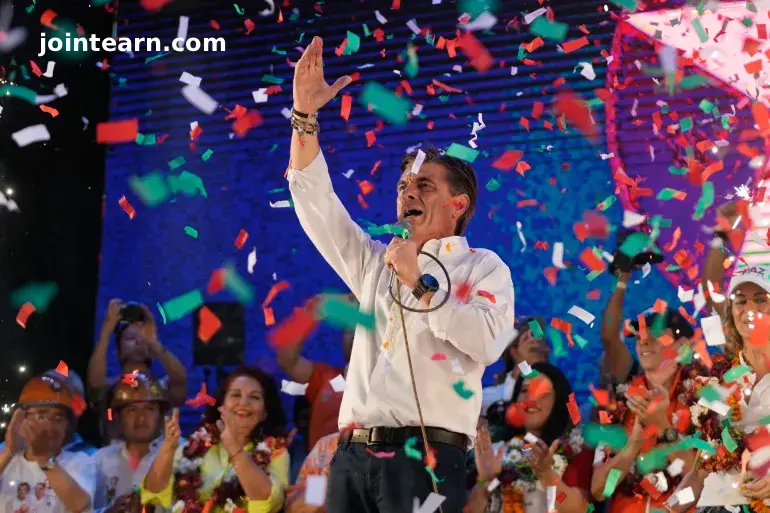
Centre-Right Candidate Rodrigo Paz Wins Bolivian Presidency
Rodrigo Paz, leader of the Christian Democratic Party (PDC), has been elected as the new President of Bolivia, marking a decisive end to nearly 20 years of left-wing rule under the Movement for Socialism (MAS).
With 97 percent of votes counted, Paz secured 54.5 percent in Sunday’s presidential run-off, defeating right-wing former interim President Jorge “Tuto” Quiroga, who received 45.4 percent, according to Bolivia’s Supreme Electoral Tribunal (TSE).
The victory ushers in a new political era for the Andean nation, as Paz promises to introduce “capitalism for all” — an agenda aimed at stimulating growth through tax reforms, tariff cuts, and government decentralization.
“We must unify Bolivia. We will rebuild this country through fairness, productivity, and opportunity,” Paz said at his victory rally in Tarija, his hometown.
Who Is Rodrigo Paz?
At 58 years old, Rodrigo Paz Zamora follows in the footsteps of his father, former left-leaning President Jaime Paz Zamora. After studying economics in the United States, Paz returned to Bolivia, beginning his political career as a city councillor and later mayor of Tarija. In 2020, he was elected to the Senate, representing the southern region.
Despite his family’s socialist roots, Paz has shifted to the centre-right, promising an open economy that he describes as “a capitalism for all Bolivians.” His policies aim to attract foreign investment, expand private enterprise, and stabilize the economy after years of fiscal turbulence.
Call for Unity Amid Economic Crisis
After the election results were confirmed, Vice President-elect Edmand Lara called for unity, urging immediate action on Bolivia’s fuel and food crises.
“We must ensure the supply of diesel and gasoline. People are suffering. Prices are rising, and corruption must end,” Lara said.
The new administration will inherit a country grappling with 25 percent inflation, foreign currency shortages, and fuel scarcities that have triggered protests in recent months.
The Fall of the Movement for Socialism (MAS)
The defeat of the MAS party marks a dramatic shift in Bolivian politics. The left-wing movement, led for years by Evo Morales, had dominated the country since 2006, transforming Bolivia through gas nationalization and social welfare programs that halved extreme poverty.
However, the party splintered after Morales was barred from running in 2025 due to term limits, and current President Luis Arce chose not to seek re-election. The division left MAS vulnerable, as the economy faltered and the public grew restless with corruption allegations and shortages of basic goods.
Morales, still influential among Indigenous and rural voters, criticized both Paz and Quiroga following the election.
“They represent only a handful of people in Bolivia. They do not represent the popular or Indigenous movements,” Morales said.
Economic Challenges Ahead
Bolivia faces one of its worst economic crises in decades, with depleted foreign reserves, declining gas revenues, and mounting fiscal deficits. Once buoyed by booming natural gas exports that generated $6.1 billion in 2013, revenues have since plunged to $1.6 billion in 2024, leaving the government struggling to fund fuel and food imports.
Paz has yet to clarify whether he will continue the fuel subsidies that have cost the state billions, suggesting at times they could be limited to “vulnerable sectors.”
Despite his pro-market stance, analysts say his administration will need to carefully balance fiscal reforms with Bolivia’s long-standing social protection systems to avoid unrest.
Restoring Ties With the United States
In his first post-election statement, Paz pledged to restore diplomatic relations with the United States, which were severed nearly two decades ago under Morales.
“We must open Bolivia to the world again. Trade, cooperation, and diplomacy will be at the heart of our new foreign policy,” Paz said.
His move signals a likely shift away from the leftist alliances of previous governments and could reorient Bolivia’s foreign relations toward Western economic partnerships.
What Comes Next
President-elect Rodrigo Paz is set to take office on November 8, 2025, succeeding Luis Arce. His first 100 days will test his promises of economic recovery, anti-corruption reforms, and political reconciliation.
While his victory reflects a public desire for change, Paz will still face opposition from the MAS bloc in Congress and from grassroots movements loyal to Morales.
If successful, his presidency could redefine Bolivia’s path toward inclusive market-driven growth after two decades of socialist governance.


Leave a Reply